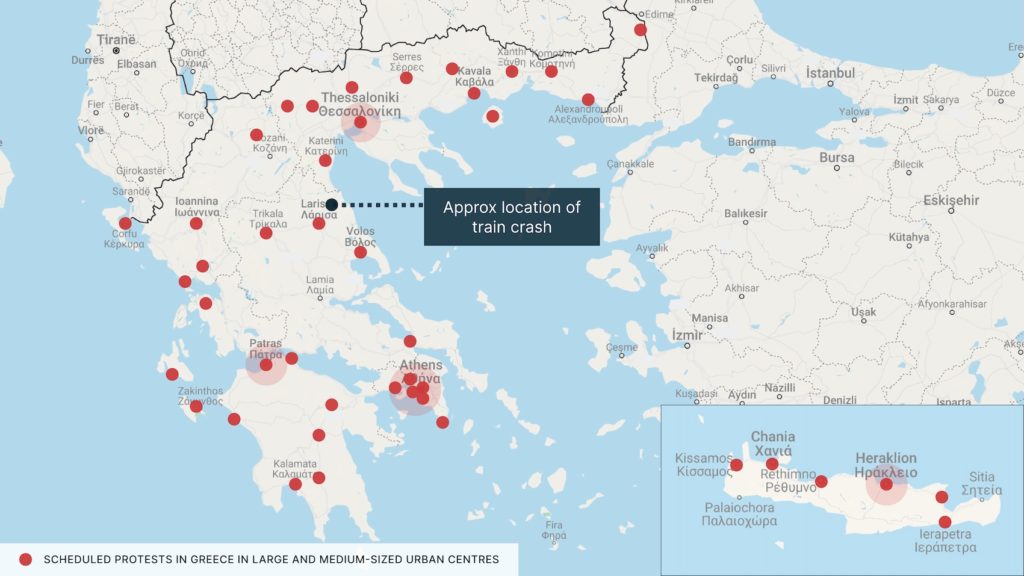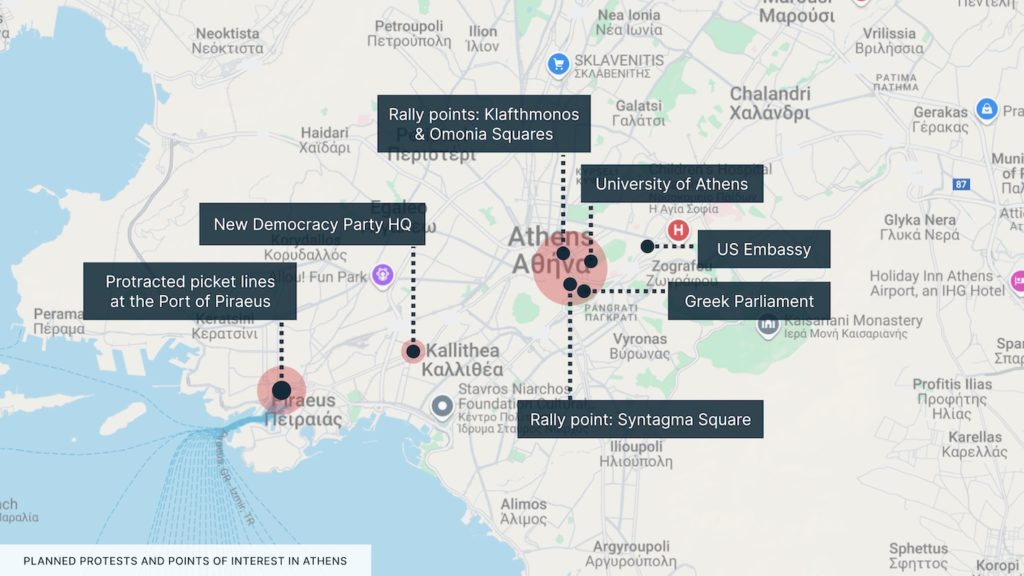Alert+
Greece Shuts Down as Protests Mark Train Tragedy
Intelligence cut off: 11:00 GMT 28 February 2025
As of 28 February, large-scale protests and widespread service and transport disruptions are ongoing across Greece. The unrest falls on the second anniversary of the worst train crash in Greek history. On 28 February 2023, a freight train crashed head-on into a passenger train in the Tempe Valley area of Thessaly, killing 57 and injuring 85. Protests are scheduled to occur at more than 350 locations across Greece, as well as in more than 100 cities that have a large Greek diaspora.
In addition to a 24-hour general transport strike, multiple other strike actions are planned. Public services, healthcare facilities, schools, cultural institutions, restaurants, shops and other businesses will be shut down or run at limited capacity. Security measures have been heightened in Athens, including the deployment of over 6,000 police officers and the use of drones and helicopters to bolster surveillance.

In the weeks and days before the protests, there have been significant updates concerning the crash. In January, leaked recordings from inside the passenger train showed that several passengers had survived the initial impact and had later died of asphyxia caused by chemical solvents illegally transported on the freight train. On 27 February, Greek authorities released a 180-page report that assessed that the crash had been caused by human error. According to the report, the passenger train was accidentally routed onto the same track as the incoming freight train.
INTELLIGENCE ANALYSIS
Government Under Fire as Greeks Demand Train Crash Justice
The crash has likely resulted in a severe and generalised loss of confidence in the government and other Greek political institutions, with many Greeks expressing the belief that the government has not done anything to achieve justice for the victims. Recent polling even indicates that over 80 per cent of Greeks feel that the Tempi train disaster was one of or the worst issues in Greece, with the vast majority also expressing that they were dissatisfied with the investigations into the incident and linking it to other issues, including socioeconomic grievances and corruption.
There is a high likelihood that today’s protests will result in significant levels of violence. Clashes between protesters and police were recorded in Thessaloniki on 27 February, and, as of the time of writing, there have been cases of improvised explosives being retrieved by authorities in the areas near the main rallying points. Violence at the protests is likely to take the form of vandalism, attacking local government and police buildings, as well as banks and other financial institutions. There is a remote possibility of protesters targeting diplomatic offices.
Greek police respond violently to severe unrest. Police are likely to deploy pepper spray, water cannons and tear gas, which may pose a threat to bystanders. While 28 February is likely to be the most severe day for unrest, it is likely that demonstrations will continue throughout the weekend, particularly in Athens and Thessaloniki.

Travel Risk Advice: Safety Guidelines for Greece
- Avoid the area of Omonia, Parliament and Syntagma Square. Avoid the Piraeus area.
- Closely monitor local news reports and government alerts.
- Monitor the OASA website for live updates on transport in Athens.
- Plan for alternative routes and means of transport in Athens and other large cities. Allocate more time for all transport.
- If caught in a protest area, try to leave quickly if it is safe to do so.
- If you are in a crowd and unable to leave, take precautions to minimise the risk of crowd crush. These include staying upright, moving away from all hard barriers, going with and not against the crowd, and holding your arms at chest level in a boxer-like stance to relieve pressure.
- Increased security presence is almost certain to continue beyond 28 February. This will likely result in protracted transport disruptions.
- Ensure that you always carry personal identification documents or copies.
- Have emergency contact numbers saved on your phone. These should include the local authorities, medical facilities and any consular support. Ensure that mobile phones are charged in case of any losses in electricity.
- Monitor the Solace Secure platform and trusted local media for updates relevant to the conflict.

